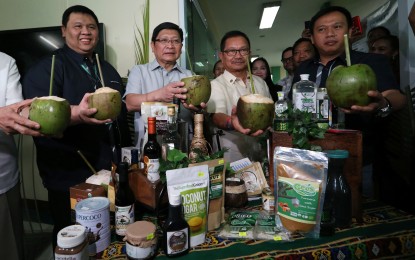
(PNA file photo)
MANILA -- The Philippines, the second largest coconut producing country in the world, has undergone transformation in the past 15 years -- from the dominance of coconut oil as the main product for export, the market profile has shifted into a multi-product industry with non-traditional coconut products gaining popularity especially with the growing concern for health and wellness.
In a statement to the Philippine News Agency (PNA) on Wednesday, the University of Asia & the Pacific (UA&P) said the transformation was influenced by supply and demand factors.
In its industry report entitled "The Coconut Industry: Local and Global Perspectives", the think-tank said while the industry's business has been dominated by the traditional coconut oil and copra, the share of these products in the country's total coconut exports have declined by 10 percent.
The UA&P noted, however, that the share of non-traditional exports, which includes coconut water, milk, milk powder, cream, among others, has increased -- driven by the increasing global consumer preference for organic and healthy products, which is fueled mainly by coconut water.
Coconut water is one of the fastest growing beverage categories in the global market. Its exports significantly grew by 154 percent per year on volume and 159 percent per year on value over the past 10 years.
Based on Philippine Statistics Authority (PSA) data, exports last year totaled 63 million liters of coconut water valued at USD89 million to different parts of the world, with the United States as its biggest market.
Vita Coco, the global leader in coconut water with 26 percent of the global market, has a market volume of 120 million liters per year supplied by nine manufacturers including Philippine companies, Axelum Resources Corporation and Century Pacific Agricultural Ventures.
Vita Coco is targeting 150 million liters in 2019.
The UA&P said coconut water has vast export possibilities. Based on estimates by market research company Technavio, the global coconut water market is projected to grow from 536.9 million liters in 2016 to 1,331.2 million liters by 2021, for an annual compounded growth rate of 26.75 percent.
Aside from coconut water, other non-traditional products also offer promising new export opportunities. Coconut milk, for example, is now an alternative coffee creamer in the United States. Gluten and dairy-free coconut milk is a growing and acceptable substitute to cow’s milk for consumers who are lactose-intolerant. Local company Axelum is now packing and selling the product in the United States.
Coconut milk powder exports have also been growing by 38 percent per year on volume and 60 percent per year on value with the Netherlands, Japan, the United States, France, and Australia as its main markets.
Global virgin coconut oil (VCO) market demand is projected to reach USD780 million by 2025, according to the August 2018 Professional Survey Report based on a compound annual growth rate (CAGR) of 2.3 percent from 2018 -2025. It is estimated that exports from the Philippines may have reached 193,000 tons in 2018.
On the other hand, desiccated coconut, which is already among the country’s top agricultural exports, continues to grow and is projected to increase by 8.6 percent per year from 2019-2023.
In 2018, exports amounted to 145,100 tons valued at USD338.4 million in the same year, with the United States, Netherlands, Australia, United Kingdom, and Canada as the leading destinations.
Axelum, a major exporter of desiccated coconut, is experiencing a high double-digit growth of 28 percent per annum of export values. It is getting more market share from other players with its advantage of having operations in the United States.
According to the UA&P, the key trends that will drive the industry include health and wellness concerns; increasing preference and premium for organic products; the need for certifications and audits from different certifying bodies especially for big markets like the United States and European Union; traceability down to the farm and production practices; and the growing concern for the environment, especially the campaign for a plastic waste-free world.
The Philippine Coconut Authority (PCA) considers the country’s coconut industry as an export-oriented sector, with the international market absorbing more than half of total production of value-added coconut products.
While the Philippines is the second largest coconut producing country, it is the largest exporter of coconut products, with total value of USD2.3 billion in 2017. (PNA)
